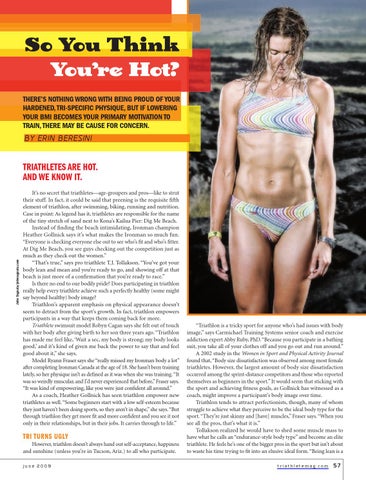THERE’S NOTHING WRONG WITH BEING PROUD OF YOUR HARDENED, TRI-SPECIFIC PHYSIQUE, BUT IF LOWERING YOUR BMI BECOMES YOUR PRIMARY MOTIVATION TO TRAIN, THERE MAY BE CAUSE FOR CONCERN. BY ERIN BERESINI
John Segesta/johnsegesta.com
TRIATHLETES ARE HOT. AND WE KNOW IT. It’s no secret that triathletes—age-groupers and pros—like to strut their stuff. In fact, it could be said that preening is the requisite fifth element of triathlon, after swimming, biking, running and nutrition. Case in point: As legend has it, triathletes are responsible for the name of the tiny stretch of sand next to Kona’s Kailua Pier: Dig Me Beach. Instead of finding the beach intimidating, Ironman champion Heather Gollnick says it’s what makes the Ironman so much fun. “Everyone is checking everyone else out to see who’s fit and who’s fitter. At Dig Me Beach, you see guys checking out the competition just as much as they check out the women.” “That’s true,” says pro triathlete T.J. Tollakson. “You’ve got your body lean and mean and you’re ready to go, and showing off at that beach is just more of a confirmation that you’re ready to race.” Is there no end to our bodily pride? Does participating in triathlon really help every triathlete achieve such a perfectly healthy (some might say beyond healthy) body image? Triathlon’s apparent emphasis on physical appearance doesn’t seem to detract from the sport’s growth. In fact, triathlon empowers participants in a way that keeps them coming back for more. Triathlete swimsuit model Robyn Cagan says she felt out of touch with her body after giving birth to her son three years ago. “Triathlon has made me feel like, ‘Wait a sec, my body is strong; my body looks good,’ and it’s kind of given me back the power to say that and feel good about it,” she says. Model Ryann Fraser says she “really missed my Ironman body a lot” after completing Ironman Canada at the age of 18. She hasn’t been training lately, so her physique isn’t as defined as it was when she was training. “It was so weirdly muscular, and I’d never experienced that before,” Fraser says. “It was kind of empowering, like you were just confident all around.” As a coach, Heather Gollnick has seen triathlon empower new triathletes as well. “Some beginners start with a low self-esteem because they just haven’t been doing sports, so they aren’t in shape,” she says. “But through triathlon they get more fit and more confident and you see it not only in their relationships, but in their jobs. It carries through to life.”
TRI TURNS UGLY However, triathlon doesn’t always hand out self-acceptance, happiness and sunshine (unless you’re in Tucson, Ariz.) to all who participate. june 2009
“Triathlon is a tricky sport for anyone who’s had issues with body image,” says Carmichael Training Systems senior coach and exercise addiction expert Abby Ruby, PhD. “Because you participate in a bathing suit, you take all of your clothes off and you go out and run around.” A 2002 study in the Women in Sport and Physical Activity Journal found that, “Body size dissatisfaction was observed among most female triathletes. However, the largest amount of body size dissatisfaction occurred among the sprint-distance competitors and those who reported themselves as beginners in the sport.” It would seem that sticking with the sport and achieving fitness goals, as Gollnick has witnessed as a coach, might improve a participant’s body image over time. Triathlon tends to attract perfectionists, though, many of whom struggle to achieve what they perceive to be the ideal body type for the sport. “They’re just skinny and [have] muscles,” Fraser says. “When you see all the pros, that’s what it is.” Tollakson realized he would have to shed some muscle mass to have what he calls an “endurance-style body type” and become an elite triathlete. He feels he’s one of the bigger pros in the sport but isn’t about to waste his time trying to fit into an elusive ideal form. “Being lean is a triathletemag.com
57
